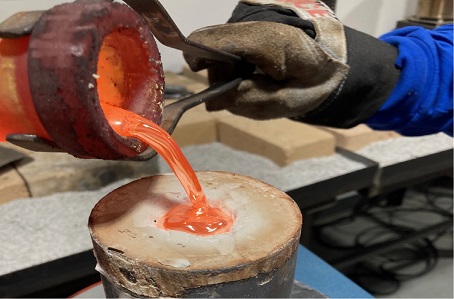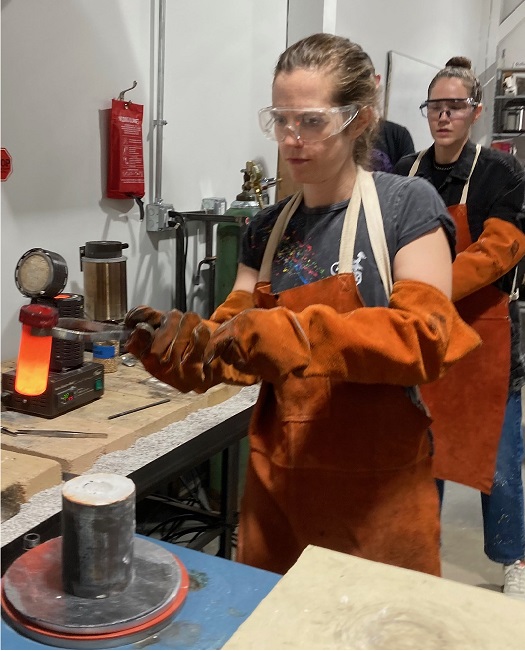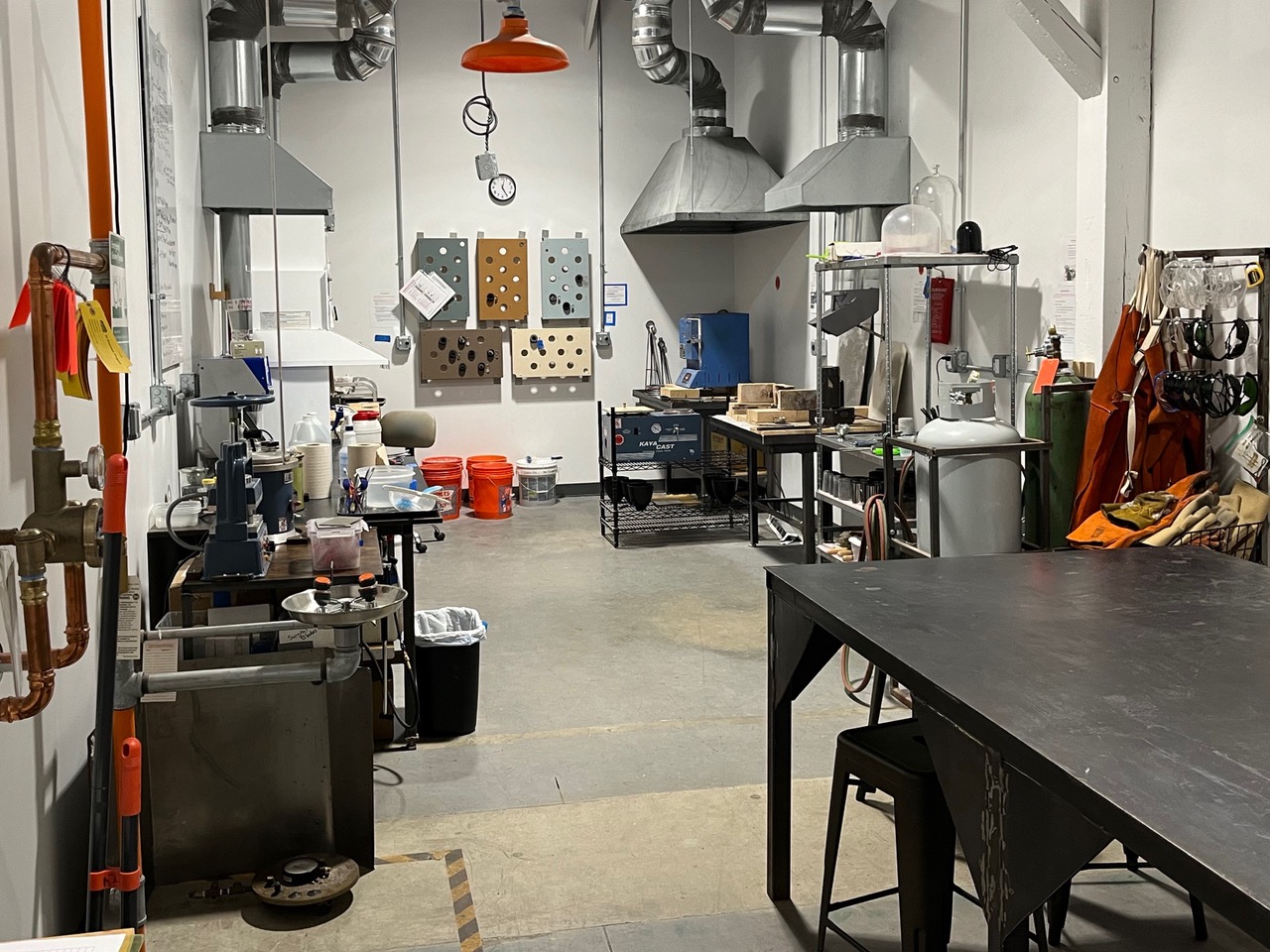Category:Casting Shop
| Casting Shop | |
|---|---|
| Casting Shop | |
| Building | Holton |
| Lead | Anne Schneider |
| User email list | castingshop-users@artisansasylum.com |
| Tool Testers | |
| Hours | Same as membership hours |
Shop Description
The Artisans Asylum Casting Shop offers equipment and training for two main processes: Sand Casting and Investment Casting.
The Sand Casting program at the Artisans Asylum allows the reproduction of objects in metal with a level of detail suitable for small sculpture, jewelry, and select engineering applications.
— This method is suitable for beginners as well as experienced shop users who are interested in producing a cast piece within the time period of a few hours.
The Investment Casting program at the Artisans Asylum involves a two to three day process that allows the reproduction of complex shapes in a way that preserves a high level of fine detail.
— This method is suitable for intermediate to advanced shop users interested in achieving exceptionally high quality and precision in their cast objects.
The Casting Shop encourages experimentation and knowledge-sharing for the production of jewelry and artwork achievable using equipment appropriate to our shop. Our facilities are oriented toward hand crafted pieces the size of jewelry and slightly larger — we do not have the resources to support larger foundry work.
Casting Techniques

| |
|---|---|
| Bronze at 2000 F |
Investment Casting at the Artisans Asylum, sometimes referred to as Lost Wax Casting, starts with the creation of a jewelry-sized object, or “pattern,” often made with wax.
— The pattern is encased in investment, a silica and gypsum based substance that resembles plaster.
—Once the investment has set, the wax is then “burnt out” using an overnight kiln program, producing a cavity into which the molten metal can be poured. The kiln program also further hardens the investment.
— At a pre-arranged time the next day, the flask containing the investment is pulled out of the kiln and immediately put on a Vacuum Table, where the molten metal is then poured with a vacuum assist.
— Once metal has cooled enough to solidify, the hot flask is then “quenched,” or submerged in a bucket of water that quickly liquifies the investment, allowing the finished casting to be easily retrieved.
Sand Casting at the Artisans Asylum involves the use of casting sand, an oil-based sand that significantly reduces the water vapor-produced concerns that come with water-based casting sands. The shop supplies Petrobond as the shop's most commonly used casting sand, and we also supply Delft Clay. Note that use of Delft Clay requires that extra vent holes be constructed in the sand mold, to allow displaced air to escape during the pour.
— Sand casting allows the reproduction of the pattern in a matter of hours, without the destruction of the original pattern.
A detailed overview of the Investment Casting process at the Artisans Asylum is available here:
https://drive.google.com/file/d/1qid-hoZIWx5stFZQGZ09LY4L7qxmhOA8/view?usp=sharing
Details on mold construction with Petrobond Sand are available here:
https://drive.google.com/file/d/1mP0Iwi35cRk-C8SCcghau3G-CnKU2bwY/view?usp=sharing
A YouTube video on the use of Delft Clay can be found here:
https://www.youtube.com/watch?v=p6D9gM1o5Ig&t=2s
List of Primary Tools
For Melting Metal:
— Electro-melt(s). Link to: Electromelt Tool Resource Page
— Oxy-Acetylene Torch. This is a RED tool. Training and testing required prior to use.
Oxyacetylene Torch Setup and shut down procedures (also posted on the shop's wall): https://drive.google.com/file/d/1swb0Yv0J0b7G7tCY_w2LV3Fud2Xd-i85/view?usp=sharing
— The shop provides appropriate graphite and clay-silica crucibles.
For Investment Casting
— Investment Hood
— Kiln. Link to: Sentry Kiln Tool Resource Page
— Vacuum Table. Link to: Vacuum Table Tool Resource Page
— The shop provides Ransom & Randolph Ultra-Vest investment and casting flasks in select sizes.
The product sheet for Ultra-Vest investment can be found here:
https://drive.google.com/file/d/1IVs3M5fmvPaCoeO9CmTQ55ZyzfqehWEH/view?usp=sharing
For Sand Casting
— The shop provides Petrobond sand, metal mold-making flasks in select sizes, and mold-making tools.
For a YouTube video on how to use the shop's vulcanizer:
https://www.youtube.com/watch?v=XasXISlbQoI
Tool Documentation
| Tool Info | Class | |
|---|---|---|
| Vacuum Table Tool Resource Page | RED | |
| Sentry Kiln Tool Resource Page | RED | |
| Electromelt Tool Resource Page | RED |
Oxyacetylene Torch Setup and shut down procedures. This is a RED tool. Training and testing required before use.
https://drive.google.com/file/d/1swb0Yv0J0b7G7tCY_w2LV3Fud2Xd-i85/view?usp=sharing
Shop Safety

| |
|---|---|
| Buddy Up! |
Always Cast with a Buddy!
For safety purposes, the Casting Shop requires that shop users work in pairs when pouring molten metal.
— Experienced Casting Buddies can be found through the shop’s Google groups email listserv.
To subscribe, send a request email directly to the list: castingshop-users+subscribe@artisansasylum.com
OR
Send and email to the Casting Shop Lead requesting to be manually added: castingshop@artisansasylum.com
Proper attire and PPE are required, especially when pouring molten metal:
— Proper Attire: Long Sleeves and Long Pants in Natural Fibers (cotton works well), Closed-toe Shoes (preferably leather). No loose hair or jewelry.
Remember: Cotton will not prevent burns. Natural fibers are a way of ensuring that melted synthetics like polyester do not complicate a burn.
— PPE: Safety Glasses (shade 3 when torch melting metal or looking into a hot kiln), Leather Apron, Heat Resistant Gloves. N95 or respirator when mixing or cleaning dry investment, respirator when pouring bronze.
IMPORTANT: Please keep tools and work surfaces reasonably clean of dried investment, which contains silica and poses a respiratory hazard when airborne and inhaled.
At minimum, N95 masks are required when mixing investment and when cleaning dry investment spills. Respirators provide additional protection. The shop maintains a supply of N95 masks. Frequent shop users must supply their own elastomeric respirator with gas-rated P100 cartridges, such as the gas/vapor 2097, 3M 60928, or D80923.
Approved Materials
Pattern Materials approved for use in the Artisans Asylum Casting Shop
— Wax (injection or carving)
— Organics - generally approved, especially for plant materials, but ask first.
— PLA
— Castable 3D printing resin, as supplied and used in the Artisans Asylum digital fabrication shop.
— To add materials to the Approved Pattern Materials List, discuss with a shop steward and propose a workable, clean melt‐out/burnout profile.
Metals approved for use in the Artisans Asylum Casting Shop
— Brass, Bronze, Copper, Silver, Argentium, Gold, Aluminum, Pewter, Bismuth
— Metals we cannot do, given high melting points: Titanium, Steel / Iron, Platinum
— Disallowed Metals: Lead, Magnesium, Anything else with flammability / toxicity issues.
No random scrap and no unknowns
Be mindful of bismuth or pewter contamination. Dust or small pieces of metals with low melting points can work their way into precious metals such as silver or gold, ruining expensive projects being worked on by fellow shop users. Please be courteous: do not grind or sand bismuth or pewter in the shop, and take extra care to clean up after bismuth or pewter work.
NO BISMUTH OR PEWTER IS ALLOWED IN THE JEWELRY SHOP.
Tool Testing in the Casting Shop
Tool Testing in the Casting Shop ensures shop users are aware of and understand shop safety protocols, and are comfortable enough with the shop’s “red” tools to avoid:
1) hurting themselves
and / or
2) causing excessive wear and tear and/or damage to shop tools.
The Casting Shop has four “Red” Tools that require training and testing prior to use:
- The Electro-Melts
- The Sentry Kiln
- The Vacuum Table
- The Oxyacetylene Torch
Note: Given the small size of the Torch crucibles, and the time it takes to melt larger quantities of metal with this tool, it is recommended that the torch be used for smaller amounts of metal and in situations where it is important to tightly control the temperature of the molten metal. Small silver castings typically benefit from a torch melt.
Testing and training on the Oxyacetylene Torch is available upon request to those who have been trained and have successfully tested out on the tools required for either Sand Casting or Investment Casting.
To schedule a tool test, you can either:
1. Schedule a test with a Tool Tester.
Visit the Tool Testing page of the Artisans Asylum website for more information on individually scheduled tool tests: https://www.artisansasylum.com/tool-testing
2. Connect with either the Shop Lead or the Assistant Shop Lead by sending a message to the Shop Lead email address at castingshop@artisansasylum.com
If you wish to use prior experience to test out on Casting Shop tools, please reach out to the Casting Shop Lead, the Assistant Shop Lead, or a Tool Tester. Send an email to castingshop@artisansasylum.com to discuss details.
Shop Calendar / Special Events
View the Casting Shop Calendar to see dates and times for Classes and Special Events.
Casting Shop Drop-by Hours, our monthly Casting Shop social, is held on the second Wednesday of the month, 5 to 8 pm. Stop by to share skills, socialize, or simply to check out what’s new in the Shop.
The monthly Casting Shop Social is currently on hold, pending change in shop leadership.
Tool Test Checklists
For General Shop Safety:
https://drive.google.com/file/d/141UoeB9Orf-fFw4KgC9OdGRkzv9iUj7T/view?usp=sharing
For Sand Casting with the Electro-melts:
https://drive.google.com/file/d/18jJNet-oZ4eBBfsrM9CnInns5bDESEWy/view?usp=sharing
For Investment Casting:
https://drive.google.com/file/d/1kaWji4XQ3Z7JaH14-2C67GRNyk12yvOs/view?usp=sharing
Bismuth and Pewter
Our tools for melting bismuth and Pewter require a light training session. This is to review safety protocols and to ensure familiarity with shop procedures.
Since the temperatures involved are equivalent to that of a hot kitchen oven, no casting buddy is required as long as the shop user knows where first aid supplies can be found, should a burn occur. THIS IS THE SHOP'S ONLY EXCEPTION TO THE SHOP'S RULE OF CASTING WITH A BUDDY WHEN POURING MOLTEN METAL.
When pouring molten bismuth and pewter alone, it is suggested that someone else in the building be made aware that metal is being poured, as a safety backup.
To receive training and testing, attend the shop's monthly Drop-by Hours, held on the second Wednesday of the month, attend a monthly Tool Testing Drop-by, or schedule with a tool tester, the Assistant Casting Shop Lead, or the Casting Shop Lead.
To review the Shop's Bismuth and Pewter Instructions:
https://drive.google.com/file/d/11BUyXPz6xNDHGcTSYjh7JpLnMkvn-KYE/view?usp=sharing
To review the Shop's Bismuth and Pewter Checklist:
https://drive.google.com/file/d/1Ta4L99yrO7P4vLUwDyfpS4nhrl1DzkDc/view?usp=sharing
Contact Us
— Send an email to the Casting Shop Lead at: castingshop@artisansasylum.com
— To stay informed, subscribe to the CastingShop-Users Google groups email list. This list is an excellent way to connect with Casting Buddies.
1. Send a request email directly to the list: castingshop-users+subscribe@artisansasylum.com
OR
2. Send an email to the casting Shop Lead requesting to be manually added: castingshop@artisansasylum.com
Pages in category "Casting Shop"
This category contains only the following page.
